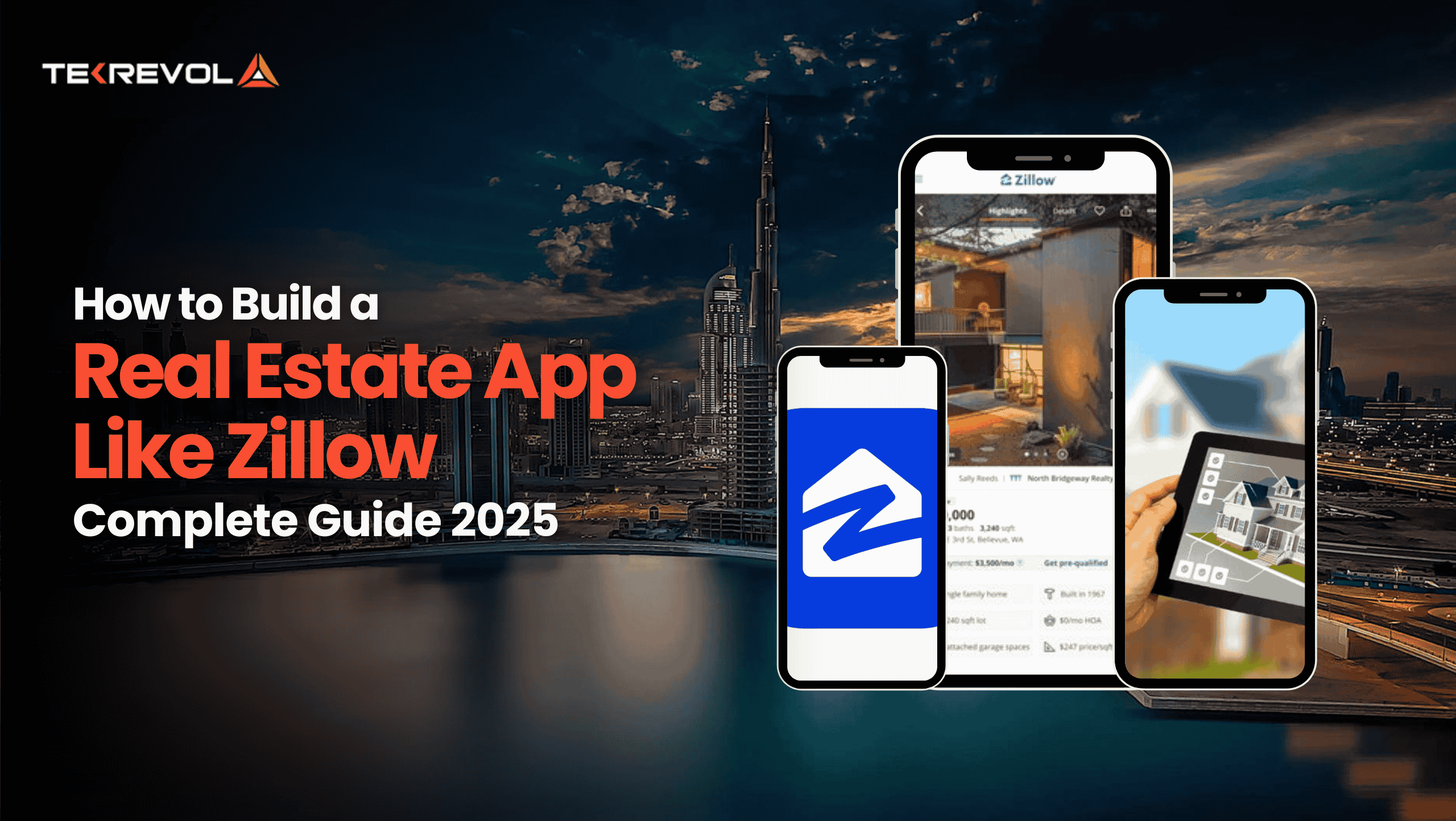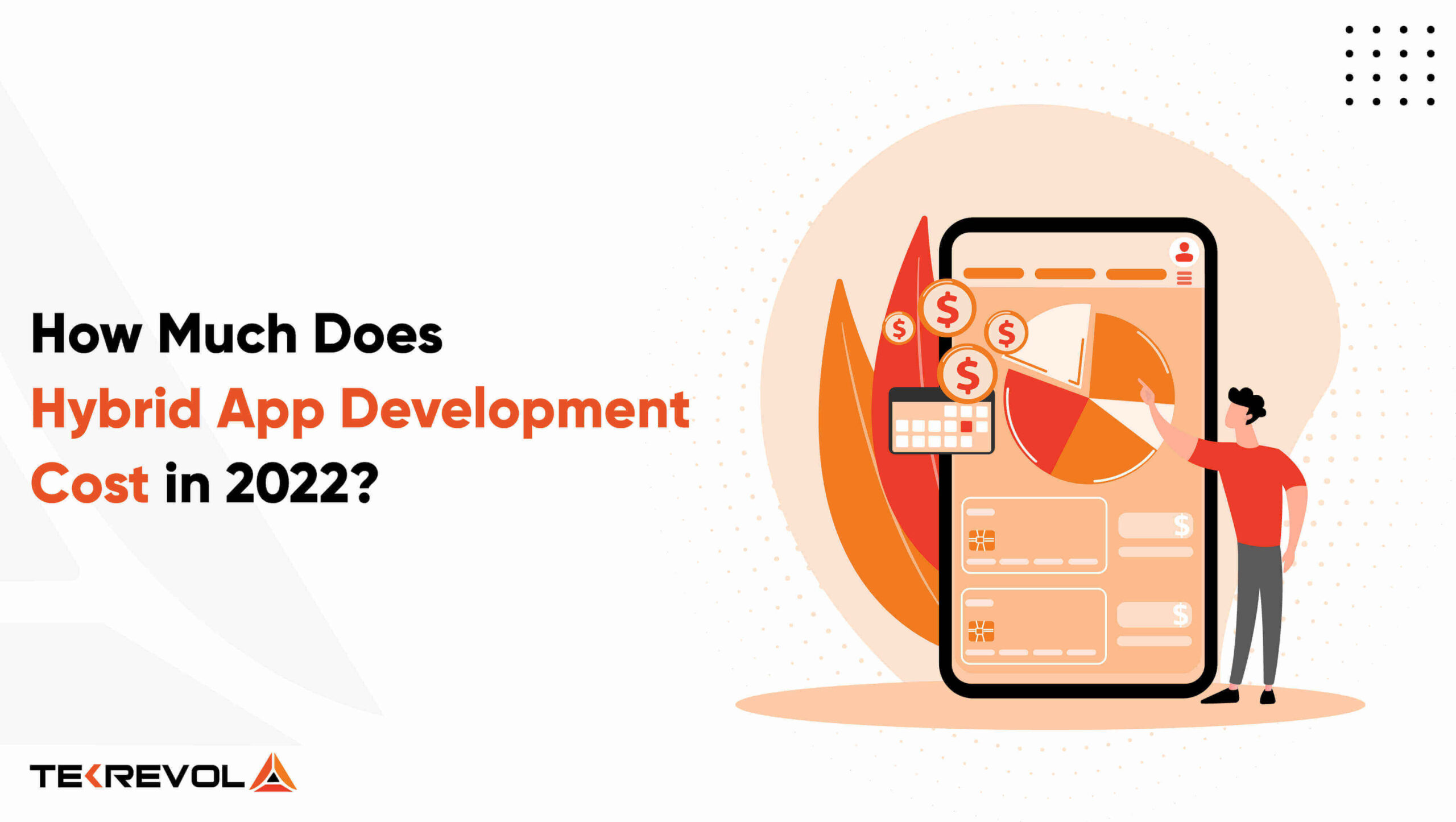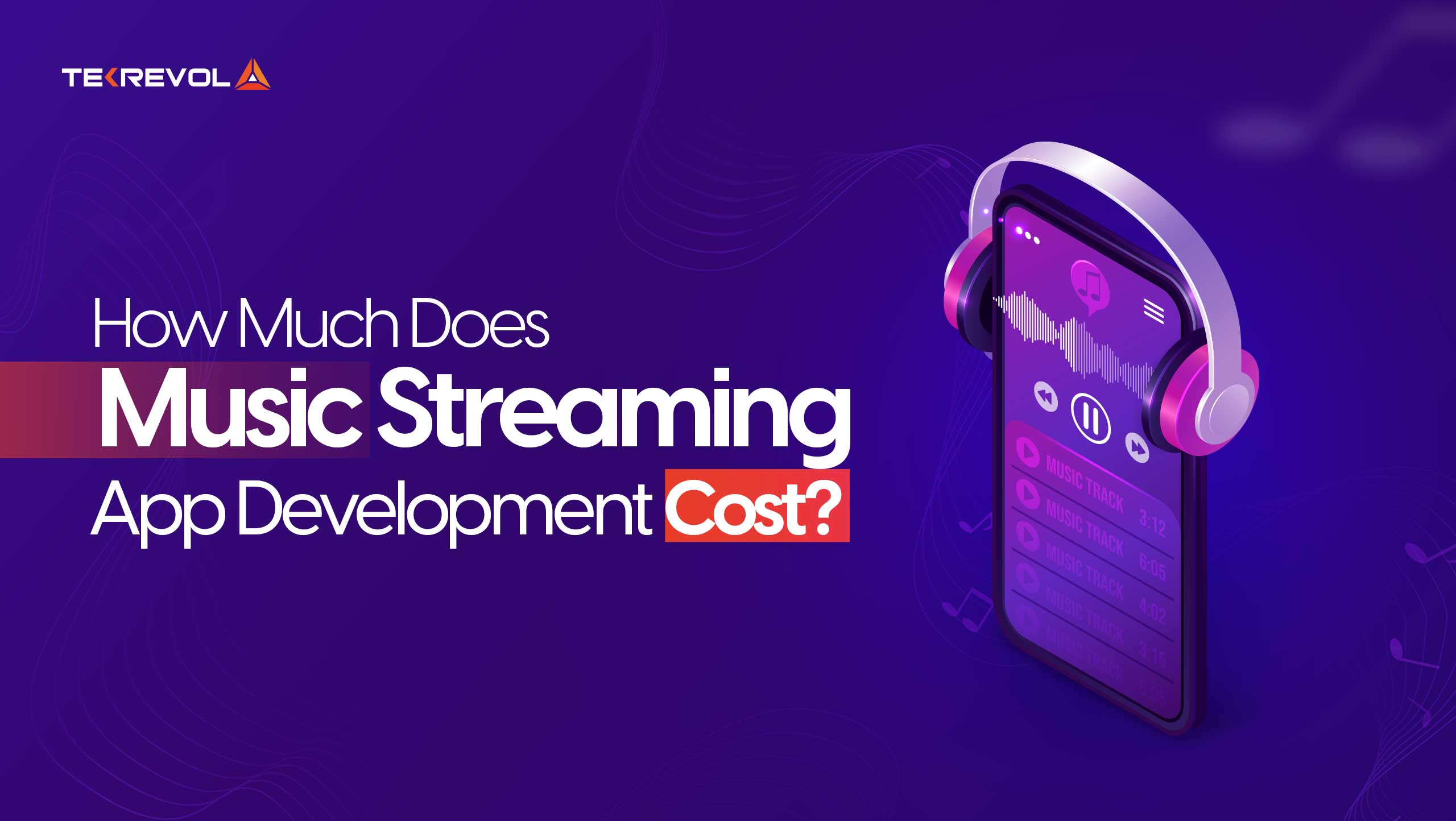Remember the days when searching for a new home meant driving through neighborhoods, squinting at “For Sale” signs, juggling appointments with brokers, and spending weekends elbow-to-elbow with other hopeful buyers at crowded open houses?
Fast forward to today, and technology has completely transformed this experience.
With just a few taps on your smartphone, you can explore countless property listings, view stunning photos, and even take virtual tours—all from the comfort of your couch.
In fact, reports from Fox Business suggest that 97% of homebuyers utilize the internet in their home search, with 76% using a mobile or tablet device.
This digital shift has created a $3813 million-dollar business opportunity, leading to the rise of real estate apps like Zillow, Trulia, and Redfin, which now dominate their respective markets.
Having said that, the demand for convenient and user-friendly real estate apps and marketplaces is only expected to grow.
If you’re an entrepreneur aiming to stand out in the real estate sector or seeking to maximize your ROI, developing a real estate app could be your ticket to success.
Read more to learn how to build a real estate app like Zillow that generates over $1 billion every year solving a critical gap in the real estate market and how you can do the same.
Decoding Zillow’s Business Model: How Does Zillow Make

Launched in 2006, Zillow has rapidly evolved into a leading player in the real estate market, boasting a staggering valuation of over $10 billion and commanding over 35.29% share of the online real estate marketplace.
With over 33 million users flocking to its site each month, it’s clear that Zillow has mastered the art of connecting buyers and sellers.
So, what is it that makes Zillow so successful?
At its core, Zillow operates on a multifaceted business model that capitalizes on various revenue streams. The platform mainly earns money through advertising, leads, and partnerships.
Let’s break down Zillow’s business model in detail.
Advertising Revenue
Advertisement Revenue is one of the principal sources of income for Zillow. The site creates high revenue and exposes the agents to possible clients since targeted adverts are available for real estate agents and brokers.
It is advantageous to the agents, and also the user experience is enhanced through relevant listings.
Zillow Offers Program
Another integral player in Zillow’s revenue model is the Zillow Offers Program. This amazing service enables a homeowner to sell their properties directly to Zillow at a cash offer, and this would make the whole selling process even easier.
By buying homes directly, Zillow can then list the houses on their platform. This creates a win-win situation for sellers and buyers.
Premier Agent Program
There is also the Premier Agent Program that connects agents with potential buyers through increased visibility on the site. Agents pay for premium placements that push their listings to the front and center, bringing more leads their way.
Mortgage Services
Zillow also makes money on the selling of ads to mortgage lenders, whose population commands a rich mortgage market. Zillow offers space for the advertisement of lenders on their interface for users who wish to finance their new homes.
IMT Segment
Lastly, the IMT Segment (Internet, Media & Technology) covers the advertising and software solutions by Zillow beyond the traditional real estate listings. This includes advertisements on non-real estate sites of Zillow like rentals, mortgages, loans, and home decor increasing the variety in ad revenues for Zillow.
In 2021, the IMT segment alone produced a revenue of $1.7 billion, as reported, making it one of the most important parts of Zillow’s Business Model.
Lessons Learned from Zillow’s Business Success
As a leader in the industry, Zillow has not only transformed how people buy and sell homes but has also set a benchmark for what a successful real estate app can achieve.
If you are dipping your toes into real estate application development, here are some valuable lessons derived from their business model and success:
- Building a user-friendly platform is a do-or-die necessity for real estate apps; prioritize the customer experience to keep users coming back for more.
- Diversifying revenue streams helps reduce risks; and explore income sources beyond property listings, which will help ensure sustainability over the long term.
- Data-driven decision-making is important; analytics should be used to understand user behavior and market trends to make adjustments to your services.
- Strong associations build trust; team up with real estate agents, mortgage lenders, and other industry professionals to broaden your offerings and reach.
- Ready to Build a Real Estate App That Stands Out?
- Partner with TekRevol, the industry-leading real estate app development company and create a solution that sets you apart.
Why Your Business Needs a Real Estate App Like Zillow
While it’s hard to believe that you don’t know why your real estate business needs an app in 2025, let me clue you in a bit.
The real estate landscape has transformed dramatically, and mobile apps are now at the very center of this change.
Do you know that 31% of Gen Y and 26% of Gen X look for homes via a mobile device? Or 89% of new home shoppers research by mobile search engines?
These numbers represent an undeniable fact: it is not just an option but an inalienable step that provides an opportunity to stand at a time of such severe competition in real estate markets.
Based on the most recent projections, in 2023, the real estate market will break a record with profits of more than $395 billion, with annual growth until 2025 at the rate of 2.15 percent. The conditions open wide for new players.
If you still are uncertain as to whether to collaborate with a real estate mobile app development company or not, then here are some convincing benefits of owning a real estate app just like Zillow by 2025:
- Higher revenue potential: Mobile applications enhance your exposure to buyers, therefore improving sales which improves the bottom line of your business.
- Cost-saving: Although the investment is there, apps can save on administrative costs by 25% in the long run.
- Optimized marketing: Apps can be used for better targeted and personalized marketing strategies with an ROI improvement of about 25%.
- Enhanced loyalty: Better retention is associated with communication through apps because about 70% reported increased loyalty to companies using dedicated apps.
With these kinds of advantages, investing in a real estate app is not just smart; it’s necessary to thrive in this market.
Essential Features of a Real Estate App Like Zillow
The biggest promises of mobile apps to the real estate market are convenience, accessibility, and increased engagement of the users.
It is only possible to realize these promises when your real estate mobile app has all the essential features to enrich the users’ journeys.
This means that users are likely to engage more actively with feature-rich apps compared to those that are basic and lack functionality.
So, you’re telling me there is a list of essential features that every real estate app must implement to beat the competition, just like Zillow does? Well, say no more!
-
User Login and Profile Management
Imagine logging into your favorite app and finding everything tailor-made just for you. That’s the magic of user accounts!
By allowing users to create personalized profiles, you can offer customized property recommendations based on their preferences and past interactions.
This not only enhances user satisfaction but encourages repeat visits, making your app feel like a trusted companion in their home search.
-
Search Engine with Database
When users open the app, they want to get into searching for their home right away. For this, a strong search engine is required. Now that users are logged in, they’re brought to the home page where they can begin their search.
In order to find the best options promptly, they will choose among numerous filters, such as:
- Type of property (house, apartment, etc.)
- Number of bedrooms and bathrooms
- Location preferences
- Price range
- Amenities (pool, garage, etc.)
This functionality ensures users can sift through listings effortlessly and find exactly what they’re looking for.
-
Interactive Maps
What if your users could visualize where their dream home is located? Interactive maps make this possible!
By integrating maps into your app, users can explore neighborhoods and check out local amenities. They can zoom in on specific areas to assess commute times or discover nearby parks and schools—all crucial factors when deciding where to live.
-
Property Listings
In real estate apps, property listings are the heart and soul of the user experience. Each listing needs to be comprehensive- suit all information that could help users make decisions- about a particular listing. So what makes up a standout property listing?
-
High-Quality Photos
Multiple images of the property are necessary. They enable people to visualize the space and understand its features better. Consider including various angles and shots of key areas like the kitchen, living room, and backyard.
-
3D Tours and Videos
Add 3D Tours and Videos to your listings so people can experience the property in all its dimensions. One can virtually walk through a particular property using this feature and find out the lay of things and flow without having the need to go there first.
-
Pricing Transparency
Clearly display the price of each listing. Before users may invest time viewing a property, they have to know what’s financially involved. Transparency in pricing earns trust and sets fair expectations for the interested buyer.
-
Home Value Estimates
Imagine having the ability to provide users with accurate home value estimates right within your app! This feature gives potential buyers and sellers critical insights into property values based on market trends and comparable sales.
By offering this kind of data, you position your app as a valuable resource that empowers users to make informed decisions in their real estate journey.
-
Real-time Messaging
Communication between buyers and agents via real-time messaging is likely to make all the difference in user experience. With this feature, users can easily discuss listings, schedule viewings, or negotiate offers.
By streamlining communication, you make the buying process more efficient and responsive, which is essential in a competitive market.
- Redefine the Future of Real Estate with a TekRevol-Powered App
- Partner with the real estate app development pioneers at TekRevol and witness your business reach new levels of success.
-
Push Notifications
Keeping your users in the loop is essential for engagement. Push notifications will alert them about new listings that match saved searches or even notify them of price changes on properties they’re interested in.
This proactive approach does not only keep users active but also prompts them to act fast when they finally find something they love.
-
Favorites and Alerts
Allowing users to save favorite properties and set up alerts for updates creates a personalized experience that keeps them coming back.
It’s always very personalized when users receive notifications regarding the saved properties, like price drops or new listings, and makes them feel more engaged with your app.
-
MLS Integration
Providing access to Multiple Listing Services (MLS) ensures that you give complete property data. With MLS in your app, you ensure that users always have access to the most current listings available in their location.
This feature gives your app credibility and improves the likelihood of users finding their dream home very fast.
-
Additional Features
To add more to the experience that your users will get in your real estate application, think about using some of the following features:
- Currency Converter: It is greatly useful to the international customer as they would need to convert prices into their local currency seamlessly.
- Forum Functionality: A dedicated space where users can discuss properties, share experiences, and ask questions fosters community engagement within your app.
- Calendar Integration: This feature allows users to schedule viewings and manage appointments directly within the app, streamlining their home-buying process.
These additional tools will enrich your app’s functionality and address various needs throughout the home-buying journey, making it a go-to platform for real estate seekers.
Advanced Real Estate Mobile App Features to Stay Ahead of the Competition
Learning to build an app like Zillow is one thing. What puts your real estate application ahead of all the others, though, is being aware of the latest trends and making your platform special.
So what can you do to build a better real estate application than Zillow? Consider these advanced features to add to your application:
-
Virtual Home Tours
Virtual home tours are the new trend in the way people ‘explore‘ properties as potential buyers. With 3D immersion, one can walk through a home from anywhere on the globe.
This feature promotes user engagement because one visualizes spaces without having to visit them physically. As this home buying gets more remote, virtual tours quickly become a must.
-
In-App Calculators
Mortgage calculators and affordability tools are trending features that empower users to make informed financial decisions. By providing instant calculations on monthly payments, down payments, and total costs, you help users understand their budgets better.
This will improve their experience and increase the value of your app as a prime resource in their home-buying process.
-
AI-Powered Chat Support
Integration of AI Chat Support will immediately provide users with the help they need in using your app. The intelligent bots might answer how-to questions about listings or processes around the clock, and users will appreciate timely responses.
-
Augmented Reality (AR)
Augmented reality allows users to visualize properties in their own space by overlaying digital information in the real world. This innovative feature helps potential buyers see how furniture or decor would look in a home they’re considering.
As AR technology becomes more accessible, integrating it into your app can set you apart from competitors and provide a unique selling point.
-
E-Signing Capabilities
E-signing capabilities save precious time and effort in simplifying document signing processes, as both buyers and sellers can check and sign all contracts electronically using the app instead of paperwork.
As convenience becomes increasingly important in real estate transactions, offering e-signing can enhance user satisfaction and expedite the closing process.
-
Blockchain Technology
Integrating blockchain technology into your app can enhance security and transparency in real estate transactions. You can reduce the risks of fraud by using blockchain for property records and transactions, and you can simplify the processes involved in title transfers.
As this technology is more widely adopted in industries, it can help you position your app as one of the forward-thinking solutions in the real estate market.
- Transform Your Real Estate App into a Market Leader
- Trust TekRevol to develop a custom real estate app that captivates users and drives growth for your business.
Choosing the Right Technology Stack for Your Real Estate App
Choosing the proper technology stack may be one of the critical choices made for developing a robust and efficient real estate app. If you get the right mixture of tools and technologies into your app, it’ll be fast, scalable, and equipped to support user expectations.
Here’s a detailed breakdown of the technologies needed:
| Platform | Technology/Tools |
| Application Designing | Adobe Photoshop, Sketch, Figma |
| iOS Application Development | Swift, Objective-C, iPhone SDK |
| Android Application Development | Java, Kotlin, Android SDK |
| Backend Development | Node.js, Ruby on Rails, PHP |
| Database | MySQL, MongoDB, PostgreSQL |
| Cloud Hosting | Amazon Web Services (AWS), Google Cloud Platform |
| Version Control | Git, GitHub |
| APIs for Mapping and Data | Google Maps API, Zillow API, MapBox |
| Push Notifications | Firebase Cloud Messaging |
| Payment Processing | Stripe, PayPal |
This technology stack lays the foundation for implementing essential features like property listings, user profiles, and advanced search functionalities.
By choosing the right tools and frameworks, you ensure a smooth development process and create an app that can compete in the dynamic real estate market.
How Long Does It Take to Create a Real Estate App?
When developing a real estate app, starting with a Minimum Viable Product (MVP) is a strategic approach that can significantly benefit your project.
An MVP allows you to focus on essential features that address core user needs, minimizing initial development time and costs.
This lean strategy not only validates your idea but also provides a tangible product to attract seed funding or demonstrate market interest for future investment.
Real estate application development involves multiple stages, each requiring dedicated time and resources.
Here’s a breakdown of estimated hours per stage:
| Activity/Stage | Approx. Hours |
| Market Research | 40–80 |
| Design Process (UX/UI) | 50–200 |
| Backend Development | 400 |
| Frontend Development | 400 |
| Quality Assurance Testing | 100–150 |
| Deployment and Launch | 20–40 |
| Total Approx. Hours | 1,010–1,390 |
Each stage demands attention to detail, from initial research to final deployment, ensuring your app is user-centric and market-ready
- Create a Winning Real Estate App with TekRevol
- Partner with Tekrevol and unlock the power of a custom-built real estate app that drives user engagement and revenue.
How Much Does It Cost to Build a Real Estate App?
How much does it cost to develop a real estate app? Well, determining the cost of “how to build a real estate app like Zillow” has no straightforward answer, as it depends on various factors.
One of the most crucial factors is the size and composition of your development team. Different roles for real estate app development will directly impact the total cost as each role brings together specific experience and skills for a project.
Typical roles may include:
- Project Manager
- UI/UX Designer
- Frontend Developer
- Backend Developer
- Mobile Developers (iOS/Android)
- Business Analyst
- Quality Assurance Specialist
App Complexity and Estimated Costs
The complexity of your app plays a crucial role in determining its development cost. Here’s an estimate based on feature sets and complexity levels that determine:
| App Complexity | Estimated Cost Range | Features Included |
| Basic | $25,000 – $45,000 | User login, property listings, search functionality |
| Moderate | $70,000 – $100,000 | Basic features + interactive maps, favorites, push notifications |
| Advanced | $100,000 – $250,000 | All moderate features + virtual tours, AI chat support, e-signing |
| Highly Complex | $250,000 – $500,000+ | All advanced features + blockchain integration, extensive APIs |
These estimates will give you a general idea of what it may cost to have an app like Zillow. Any changes or features you want added will change the final price.
How to Choose the Right Team to Outsource Your Real Estate App Development
Now that you know about the essential features your app needs, and understand how to build a real estate app like Zillow, it’s time to make a crucial decision: who will you outsource your development to? Choosing the right team can significantly impact your app’s success.
How to Select the Right Development Partner
- Experience: Teams having proper experience in app development are better, especially if that involves real estate.
- Portfolio: Go through what they have done. Any good portfolio should have applications relevantly similar to the type that you would like them to develop.
- Technological Expertise: If they have experience with any of the technologies you use in your application, it’s also excellent.
- Communication skills are very important. A good communication-friendly development partner is very essential.
- Cultural Fit: Choose a team that aligns with your company’s values and vision.
Nearshore vs. Offshore Development
- Nearshore: Often offers similar time zones and cultural compatibility, facilitating better communication.
- Offshore: Can provide cost advantages, but may come with challenges in coordination and time differences.
You can find potential partners on platforms like Clutch, GoodFirms, Behance, and Dribbble. Always check reviews and their portfolio, ensuring they have experience with real estate apps.
What is the Hourly Rate for an Outsourced Team?
Understanding the typical rates for outsourced development teams is crucial for budgeting your project. Here’s a quick overview based on region and expertise level:
| Region | Junior Developer | Mid-level Developer | Senior Developer |
| North America | $50 – $150 | $100 – $200 | $150 – $300 |
| Europe | $30 – $100 | $50 – $150 | $100 – $200 |
| Asia | $15 – $50 | $25 – $75 | $50 – $100 |
| South America | $20 – $60 | $30 – $80 | $60 – $120 |
These rates could change depending on the complexity level of your project and the type of skills that may be needed. Investing in the right team is necessary to deliver a robust app for real estate.
- Ready to Build a Faster-to-Market Real Estate MVP?
- Collaborate with TekRevol, the experts in rapid real estate app development, and get your MVP to market quickly.
Choosing the Monetization Model: How Will Your Real Estate App Make Money?
Alright, you’ve chosen a good idea for an application, and you’ve dedicated your precious resources; the question is, do you know how your real estate application will make money? Or hasn’t thought about it so much yet? Well, fear not; we’ve got you covered with that.
There are numerous monetization models that prove effective in the app industry; however, here are some of the most tested and tried monetization methods specifically for real estate apps for monetary profit.
Subscription Models
Subscription models allow users to access premium features or exclusive listings for a recurring fee. This strategy provides a steady revenue stream while offering users ongoing value.
Popular apps like Zillow use subscription plans for real estate agents to promote their listings more prominently.
In-App Advertising
Selling space within your app for ad campaigns is a great way of monetizing. You can always enter partnerships with property management companies, mortgage lenders, or similar business ventures to let your app display targeted and meaningful advertisements to your audiences.
For example, Realtor.com uses advertising to put side-by-side relevant services with your properties listed.
Lead Generation
Lead generation involves capturing user information and selling it to real estate agents or agencies. This model benefits both parties: agents gain access to potential clients, while you earn revenue from each lead sold.
Apps like Homesnap effectively implement this strategy by connecting users with local agents.
Sell Ad Slots to Property Management Companies
Offering ad space specifically to property management companies can enable the creation of targeted advertising for landlords and property owners searching for fill vacancies. The model brings in revenue but also adds value for the users of your application, looking for rentals.
Offer Premier Service Offering to Real Estate Agents
Offer premium services to real estate agents like increased visibility for their listings or advanced analytics about user engagement. This model will let agents invest in better exposure and leads while providing you with a solid revenue stream.
Sell Ad Slots to Mortgage Lenders and Similar Businesses
Mortgage lenders are always looking for ways to connect with potential clients. By selling ad slots in your app, you can facilitate these connections and earn additional income. This strategy works well in apps like Trulia, which features mortgage calculators alongside lender advertisements.
How Can TekRevol Help You Create a Winning Real Estate Mobile App?

The demand for innovative real estate solutions is skyrocketing, with the global real estate app market projected to reach over $1 trillion by 2026. As the industry evolves, having a reliable development partner is crucial for turning your vision into reality.
At TekRevol, we understand the unique challenges of real estate app development and are committed to delivering tailored solutions that meet market demands.
TekRevol specializes in creating cutting-edge mobile applications that cater specifically to the real estate sector. With 150+ successful projects under our belt, our team combines technical competence with knowledge in the specific domain to make apps not just technically correct but also engaging to end-users.
Being a trusted real estate application development company, our portfolio reflects extensive capabilities to evolve and bring innovations across a range of platforms, thereby ensuring excellent service delivery according to your goals.
Selecting TekRevol ensures partnering with dedicated teams that only prioritize one thing – your success. Through support from development, and designing initial concepts to after-launch maintenance, they help you meet all your milestones.
With our focus on quality and user experience, we’re here to help you create a great real estate app in a competitive market.
Let’s turn your ideas into reality—contact us today!
- Ready to Create a Real Estate App Like Zillow?
- Leverage TekRevol's expertise in developing market-leading real estate apps that captivate users and drive growth.











